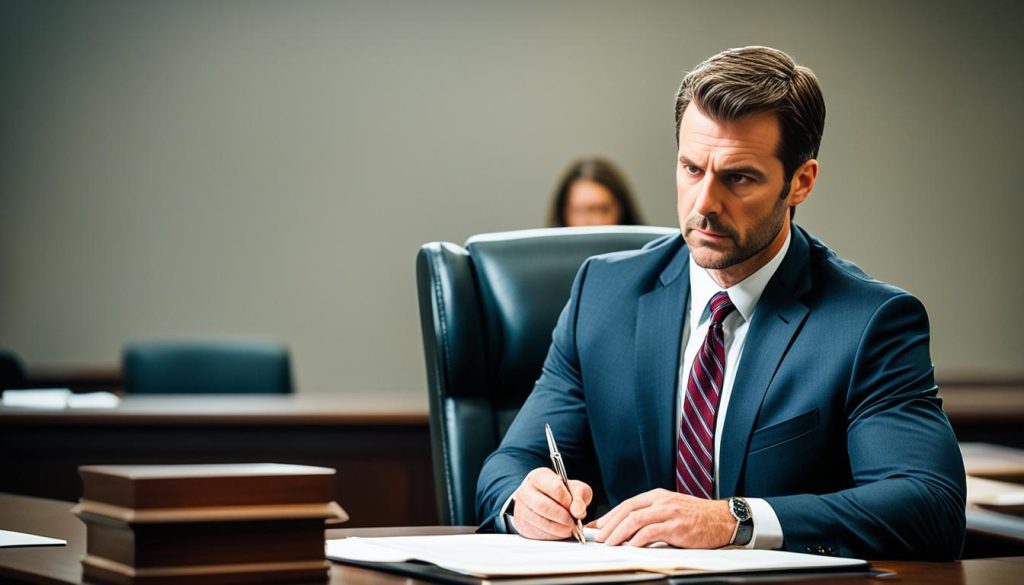Criminal defense attorneys are key in the U.S. justice system. They make sure every person accused of a crime gets to defend themselves. They work from the start of the legal process to the end, aiming to protect their clients’ rights and fight for the best outcome1.
They have many important tasks. These include learning about the charges and laws, creating a plan for the case, talking about plea deals, and speaking for their client in court. They also make sure their client’s rights are respected2.
Key Takeaways:
- Criminal defense attorneys play a crucial role in protecting the rights of individuals accused of crimes.
- They are responsible for understanding the charges, developing legal strategies, and negotiating plea deals on behalf of their clients.
- Defense attorneys advocate for their clients in court, presenting evidence, cross-examining witnesses, and challenging the prosecution’s case.
- Confidentiality and attorney-client privilege are essential in the legal representation process.
- Adequate funding for indigent defense services remains a persistent challenge, despite the importance of ensuring fair proceedings.
Understanding the Charges and Legal Landscape
As a criminal defense attorney, you need to deeply understand the charges against your client and the laws of their case. Knowing the legal landscape well is key to making a strong defense strategy3.
Analyzing Applicable Laws and Statutes
You must look closely at the crime and the laws that apply to your client. This means studying the details of the charges, knowing the possible penalties, and finding legal defenses or factors that could lessen the charges4.
Comprehending the Specific Criminal Case Details
It’s also vital to get the details of your client’s case5. This means collecting and reviewing evidence, understanding when events happened, and finding witnesses or other info that could change the case3. Knowing these details helps you make a defense plan that fits your client’s situation, which can lead to a better outcome5.
| Criminal Offense | Potential Penalties | Defense Strategies |
|---|---|---|
| Assault and Battery | Fines, Jail Time | Self-Defense, Lack of Intent |
| Drug Possession | Fines, Prison | Entrapment, Consent |
| DUI/DWI | Fines, License Suspension | Challenging Evidence, Necessity |
By understanding the charges, laws, and case details, you can craft a tailored legal strategy. This helps protect your client’s rights and interests4.
Developing a Customized Legal Strategy
As a defense attorney, your main goal is to create a legal plan that fits your client’s case perfectly. You must analyze the charges and laws closely, and look deeply into the prosecution’s evidence6.
Challenging Prosecution’s Evidence
Challenging the prosecution’s evidence is key in your strategy. You should check police reports, witness statements, and physical evidence for any weak spots or inconsistencies6. Experts like forensic specialists can also help by offering different views and countering the prosecution’s arguments7.
Negotiating Plea Deals
In some cases, talking to the prosecutor about a plea bargain might be the best move for your client. You need to think about the risks of going to trial versus the benefits of a plea deal, which could mean less severe charges or a shorter sentence7. Make sure any plea deal you agree to is truly in your client’s best interest.
Your job as a defense attorney is to give your client the strongest legal defense possible. By making a strategy that fits their case, challenging the prosecution’s evidence, and negotiating smart plea deals, you can boost the chances of a good outcome for your client8.

| Challenging Prosecution’s Evidence | Negotiating Plea Deals |
|---|---|
|
|
“The art of the defense attorney is to uncover the truth, challenge the prosecution’s case, and advocate for the best possible outcome for the client.”
Using a strategy tailored to your client’s needs can help you represent them well and increase the chances of a positive outcome8. Remember, each case is different, so your strategy should be flexible to fit your client’s unique situation7.
defense attorney, criminal defense, legal representation
As a defense attorney, your main job is to protect the rights of people accused of crimes9. You are key in the criminal justice system, handling cases from small crimes to serious ones9. Your skills and support make sure your clients’ rights are protected from start to finish9.
Being good at criminal defense means knowing the law well and creating plans for each client9. As a defense attorney, you look at the laws, question the prosecution’s evidence, and work on plea deals when it’s right9. Your knowledge and experience help your clients get through tough legal times and reach good outcomes9.
Legal representation in criminal cases also means looking at other issues, like immigration, job problems, and work limits9. You make sure your clients are looked after in every way, protecting their future and reducing the effects of their legal issues9.
Whether you’re experienced or new, your hard work and belief in justice are key to a fair criminal justice system10. With your skills, planning, and strong support, you can really help people facing criminal charges10.

As a defense attorney, you can greatly impact your clients’ lives, defending their rights and fighting for what’s best for them11. Your hard work ensures justice is done and the justice system is fair and fair-minded11.
Courtroom Representation and Advocacy
As a criminal defense attorney, you play a key role in the courtroom. You present evidence, question witnesses, and make arguments to help your client. This can change the outcome of the case12.
Presenting Evidence and Cross-Examining Witnesses
It’s vital to gather strong evidence for a solid defense. You must review the prosecution’s evidence and find any weak spots12. Being good at questioning witnesses can also turn the case around.
Delivering Persuasive Arguments
In the courtroom, words are your weapons. You need to know the laws well and tell a story that moves the judge or jury13.
Your job is more than just winning. It’s about protecting your client’s rights and making sure they get a fair trial12. With hard work and legal knowledge, you can greatly influence your client’s case.
“The true measure of the criminal justice system is the difference it makes in the lives of the people it serves.” – U.S. Supreme Court Justice Anthony Kennedy
Protecting Client’s Constitutional Rights
As a defense attorney, your main job is to protect your client’s constitutional rights14. This means making sure they are treated fairly and their rights are respected. You also need to ensure they get a fair trial15. Your knowledge of the law is key in fighting against illegal searches and protecting your client’s right to remain silent14.
Creating a strong defense plan is crucial to protect your client’s rights14. This means doing deep legal research, preparing well for the case, and carefully looking at evidence and talking to witnesses14. Picking the right jurors during the Voir Dire process also helps your client’s case15.
It’s also important to support your client emotionally during the criminal process15. By offering emotional support and staying updated on legal changes, you can make sure their rights are protected from start to finish14.
Even if the outcome is not what you hoped for, your role is to ensure your client was treated fairly and legally15. Your commitment to defending your client’s rights shows your professionalism and dedication to justice14.
| Constitutional Right | Description |
|---|---|
| Right to Remain Silent | Clients have the right to refuse to answer questions from law enforcement without an attorney present15. |
| Right to Legal Counsel | Defendants have the right to have an attorney represent them during all stages of the criminal justice process15. |
| Right to a Fair Trial | Clients are entitled to a fair and impartial trial, with the prosecution bearing the burden of proof15. |
| Protection Against Unlawful Searches and Seizures | The Fourth Amendment prohibits unreasonable searches and seizures, which may be challenged by the defense attorney14. |
Conclusion
Criminal defense attorneys are key in the U.S. justice system. They know a lot about criminal law, how courts work, and legal tactics. This knowledge helps them protect their clients’ rights and freedoms16. They are great at understanding charges, looking at laws, and making legal plans17.
These attorneys are good at questioning the prosecution’s evidence, making deals, and speaking for their clients in court16. Working with firms like Marin, Barret, & Murphy Law, they use their skills and resources for top-notch legal help16. If you or someone you know is facing criminal charges, finding a skilled attorney is key. They will fight for your rights and aim for the best outcome17.
Dealing with an arrest, an investigation, or charges can be tough. A criminal defense attorney can be a big help in the legal process17. They know about criminal law, negotiating, and speaking in court. This can greatly improve your chances of a good outcome and reduce the impact of a conviction16. Don’t wait to look into your legal options and work with a criminal defense attorney to safeguard your rights and interests17.
FAQ
What are the key responsibilities of a criminal defense attorney?
Criminal defense attorneys have many duties. They must understand the charges and laws well. They also need to create a strategy, negotiate deals, and protect their client’s rights in court.
How do criminal defense attorneys analyze the charges and laws?
They dive deep into the alleged crime and the laws related to it. They study how the laws fit their client’s situation. This knowledge helps them plan a strong defense.
What are the steps a criminal defense attorney takes in developing a legal strategy?
First, they look closely at the charges and laws. Then, they craft a strategy just for the case. This might mean questioning the prosecution’s evidence or negotiating with the prosecutor. Their aim is to reduce or dismiss charges for the best outcome.
What is the role of a criminal defense attorney in the courtroom?
In court, they speak for their client. They present evidence, question witnesses, and try to convince the judge or jury. They must be well-prepared and know the law well to make strong arguments.
How do criminal defense attorneys protect their client’s constitutional rights?
They make sure their client is treated fairly and their rights are respected. They fight against unlawful searches and protect the right to remain silent. Their goal is a fair trial for their client.

